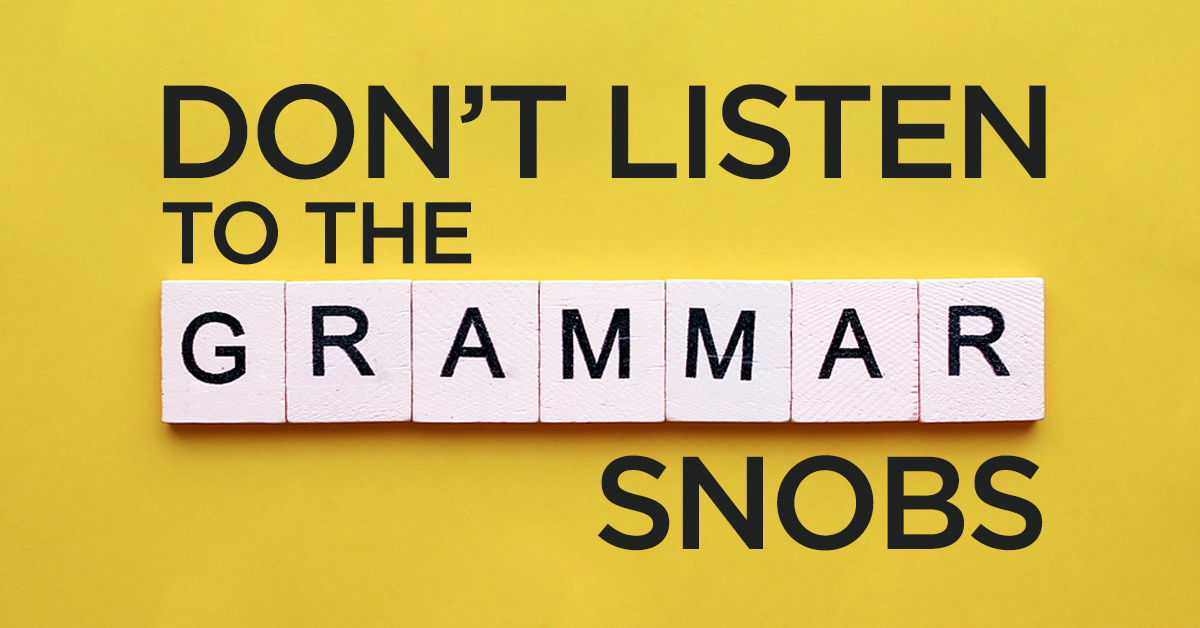Can you split infinitives? End a sentence with a preposition? Start a sentence with a conjunction? If you’re a purist, you might cling to prescriptive grammar and say no to all of the above. That’s because your focus is on all of the ways that words should be used in accordance with strict grammar rules. But many will contend that descriptive grammar and its focus on how language is used is the way to go in copywriting. We asked writers to weigh in. Here’s what they had to say.

Tadeusz Olewicz
Tadeusz Olewicz, Marketing Specialist for Channels.
Table of Contents
Care about the trademarks of your style
I think you should care about the trademarks of your style – non-conventional analogies, unique word choice, etc. Obviously, your priority is still to convey the message, but I don’t think a copywriter should be limited by any strict rules.
However, the linguistic experiments are acceptable as long as you can explain them. If you provide a loud and clear background for your way of expressing your thoughts, you are justified.
Copywriting is a piece of art – even the drawings by Pablo Picasso could be considered garbage by someone uninformed. But, when you study the inspirations of an author, analyze the whole cultural movement, listen to his opinions about art – you know everything you need to judge.
It’s the same with copywriting. You read something, you point out some mistakes, unnecessary digressions, bad word order. But, let the copywriter describe his approach. This is when you’ll get a full perspective.
Prescriptive grammar has strict rules – it tells you how to speak, how to write, what to use, what to avoid, etc. I think this approach limits your possibilities to provide content that attracts the readers.
Once again, I emphasize that the descriptive approach in copywriting is fully explicable only when the author follows basic guidelines, such as thorough research, etc. Then, you are free to develop your own style of writing.
Communicate to your target market effectively
In copywriting, it’s best to go with descriptive grammar rather than prescriptive. Why? You need to communicate to your target market effectively. If you use prescriptive grammar, there might be the risk of miscommunication and confusion. You need to effectively reach out to people, though in some sense, it may not be following some grammar rules.
In my industry, I would prefer to use terms that people commonly know. If I communicate using hifalutin words and follow grammar rules strictly, my target market will not be able to connect with what I’ve written. It’s like explaining to someone why a tomato is considered a fruit, yet it’s commonly known as a vegetable. Make writing understandable and relatable rather than grammatically perfect – leave that kind of writing to academic papers and case studies.

Michael Humphreys
Michael Humphreys, Founder & CEO of Z Grills Australia.

Chirene Hughes
Chirene Hughes, Owner of Two Red Crows Brand Storytelling.
There’s no formula
The trick in copywriting is that it must look professional, but also avoid making the audience feel like fools. Prescriptive grammar is often too right. Alienating my target customer is the last thing I can afford when writing marketing copy. On the other hand, flouting grammar rules makes for wobbly copy that leaves people wondering whether the brand really has what it takes. Unfortunately, there’s no formula: every job asks for a different grammar balance. And that’s as easy as riding a bicycle on a swaying tightrope. In the dark. With a spelunking spotlight on my helmet to remind me of how wrong it could go.
Connection to get a message across
Today's world is built on a connection economy, so naturally, I prefer descriptive grammar. It feels more “natural” to the reader and thus forms a strong connection to the content. As a copywriter who particularly enjoys personality-infused copy, descriptive grammar is a huge contributor to the way I amplify words to deeply connect.
While I don't serve a particular industry, the type of writing I do focuses on connection to get a message across. Connection drives inspiration, which results in conversion, so being able to speak and utilize more “common” language/linguistics is best.

Jenn Hanft
Jenn Hanft, CEO and Founder of JOUHCO, is a copywriter based in Austin, TX.

Cady Cohen
Cady Cohen is an SEO Account Manager at Tandem Interactive who enjoys injecting her creativity into her marketing efforts.
There is no right or wrong approach
As a copywriter and SEO editor, I have learned each client and piece of copy will require different items. Grammar is very much situational. If you are writing a more informative or educational copy for a client, then prescriptive grammar might be the way to go. But for more creative copy, descriptive grammar is a better option.
Technically, there is no right or wrong approach when it comes to creating compelling copy for clients. The reason being, copy is written solely for your audience. Your copy must attract and engage the interest of your audience, which means you have to find a way to write in a way to connect to your readers. You don’t want your copy to sound like a scholarly journal.
Find a way to engage your audience's interest, whether that is through descriptive grammar in a more flexible, fun, and conversational language, or through a more serious and strict language with prescriptive grammar.
Descriptive is almost always the answer.
When it comes to prescriptive vs. descriptive grammar, I find that descriptive is almost always the answer. I work with a wide range of restaurant and travel clients and find that descriptive writing really allows the reader to taste the food and feel the breeze through writing; however, the same can be said for clients in other industries as well.
I myself don’t like to conform to rules and the same can be said through my writing. With descriptive writing, thoughts can easily flow together better to create a story, versus worrying about offending someone in the way that a sentence is structured.

Kristen Skladd
Kristen Skladd is a PR executive located in South Florida. Find her at Thegabgroup.com
This is a crowdsourced article. Contributors are not necessarily affiliated with this website and their statements do not necessarily reflect the opinion of this website, other people, businesses, or other contributors.




0 Comments